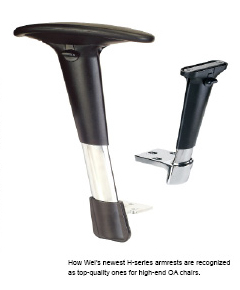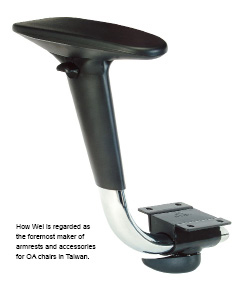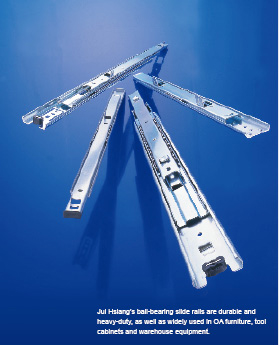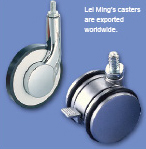Not All Doom and Gloom in Taiwan's OA Furniture Parts Sector
2010/01/05 | By Steve Chuang
The global meltdown hasn't spared Taiwan's metal OA furniture sector, now the most globally competitive sector in the island's overall furniture industry, as its export trade still shrank sharply in the first nine months of 2009, compared from a year earlier.
Statistics from the Taiwan Customs show that the island's makers exported around 19.62 million kilograms of finished metal OA furniture worth NT$1.371 billion (about US$42.15 million) in the past nine months of this year, plummeting 32.46% and 26.6%, respectively, from 29.05 million kilograms and NT$1.868 billion (US$54.74 million) posted a year earlier.
USA Still Reigns
The statistics also show that the U.S. absorbed 12.92 million kilograms of Taiwan-made metal OA furniture valued at NT$818 million (US$25.16 million) to remain the island's largest buyer, while the U.K. imported 311,549 kilograms worth NT$19.837 million (US$610,369) as the biggest European buyer in terms of volume. Comparing with 20.54 million kilograms to the U.S. and 362,487 kilograms to the U.K. for the same period in 2008, such figures are a sign of the times.
Supply and demand work inevitably to impact the entire production chain, so with lower exports of metal OA furniture, so have the makers of OA furniture parts been rocked in the last nine months. However and boasting various advantages, three seasoned suppliers in the line interviewed by CENS said they have been working hard to counter the hardship, waiting for significant sales recovery in the near future.
How Wei Metal
How Wei Metal Industrial Co., Ltd. is a maker who has successfully diversified by crossing from one sector to another, now having built a solid name as an OEM (original equipment manufacturer) of OA chair parts with its unparalleled production and R&D capability.
Before its establishment in 1980 in Tainan County, southern Taiwan, How Wei had accumulated ample experience in producing auto and motor parts and fitness equipment. Such experience, says chairman Ronnie Hu, has helped in his success by enriching the company's know-how in metallurgy and structural design.
After nearly 30 years of dedicated production and development of OA chair parts, including armrests, armrest pads, synchronized mechanisms, footrest rings and seatback adjustment devices, the company has evolved into a recognized maker with hundreds of items, and three factories in Taiwan. In fact, How Wei is the foremost maker of armrests and armrest pads on the island.
Believing that market demand won't rebound significantly in the next few years, Hu opts to focus on maintaining customer relations, instead of floundering in panic, as he waits for better times. "After all, OA furniture products are not perishables, and many enterprises have deferred replacement purchases for one to two years due to the economic uncertainty. This is one reason we're not making major moves, as staying in familiar territory makes sense for now," he says.
To infer that Hu is pessimistic based on his latest business decisions would be inaccurate, especially considering that his is one of the few Taiwanese makers who has tapped the high-end OA furniture segment in the U.S. Simply, Hu has no need to take big risks amid the downturn, especially when he has cutting-edge production and R&D capabilities as well as a top-end market share of high-quality armrests and armrest pads.
Recognized in USA
Among the various products, the "H series armrest assembly" is How Wei's most enviable product among American OA chair producers and designers, one featuring aluminum body, ergonomic armrest pad fully of non-toxic, recyclable polymers. Innovative structural design makes the pad easier to rotate, quieter than competing models. Also and not often emphasized, an easy-locking mechanism on the pad enhances safety, preventing a sitter from losing steady support as one gets up.
Despite being mainly an OEM, Hu says that, to turn out products with excellent functionality and practicality, his company does what it can to stay atop of the newest market trends. The best part is that the company fears not underselling rivalry for it is recognized by American OA furniture designers, says Hu.

Jui Hsiang Enterprise
A specialist maker who continues to enhance functionality of drawer slides and slide rails, Jui Hsiang Enterprise Co., Ltd. has seen such effort pay off as corporate sales has gradually recovered since the beginning of the third quarter of 2009, according to Z.J. Wu, the chairman.
Since its inception in 1997 in Yunlin County, southern Taiwan, Jui Hsiang has been an OEM of ball-bearing slide rails for furniture, OA furniture and tool cabinets. Backed by years of experience in slide-rail making machinery, Wu has achieved success in the line despite a decade of fierce competition against domestic and overseas rivals.
Wu says that his expertise in slide-rail making machinery is pivotal to his company's survival and growth. "Most rivals decide to venture into the field for having in-house lines of roll-forming machinery; but such machine is not completely suitable to make ball-bearing slide rails, without being able to assure slide precision equaling that of ball-bearing slide rail making machine. Ultimately, most of them, also lacking knowledge about mold design, flop," says Wu.

Truly Professional
In contrast, Jui Hsiang is a professional, not an interloper as many rivals, familiar with product development and production technologies, dedicated machines, material science etc., enabling his firm to turn out ball-bearing slide rails that are durable and heavy-duty. Also equally notable is that the company is green: using RoHS (Restrictions on Hazardous Substances)-compliant surface treatment technologies that are entirely free of lead and hexavalent chromium.
The maker is also innovative for it has focused on functionality enhancement, having introduced a series of slide rails with self-retracting mechanism and buffers, which are widely adopted by OA furniture makers in Taiwan. Furthermore, a new model is under development that focuses on intrusion-deterrence, one that has an innovative, auto-lock mechanism to lock all drawers of a file cabinet as soon as one is opened, according to Wu.
"Although ball-bearing slide rails are nothing more than components for OA furniture that generate modest margins, we are passionate about perfecting quality and functionality to put Jui Hsiang in the lead in Taiwan," beams Wu.

Lei Ming Industrial
Lei Ming Industrial Co., Ltd., a specialized supplier of casters founded in 1982 in Changhua, central Taiwan, is notable for production efficiency achieved through clustering of furniture parts makers and related subcontractors in central Taiwan.
Specializing in production of wheel casters for residential and commercial uses, Lei Ming is a well-known OEM on the island, especially recognized for being dedicated to improving quality and customer service. Presently, the company's casters are popular in North America and Japan.
Trying to emulate major global makers in the line such as TEND of the U.S. and SKK of Japan, Lei Ming chairman Jack Sung says that his company develops castors that are durable and compact. "In fact, we learn state-of-the-art production technologies and design concepts from Japanese enterprises, enabling us to sharpen competitiveness. For instance, we have been inspired, through working with Japanese, to significantly raise using polymers to build casters to enhance durability and variety in exterior finishes."
Multinational Patents
Besides, drawing on its expertise in structural design to improve strength and loading capacity, the company has obtained numerous multinational patents, attesting to its independent R&D capability.
Essential to its success and production efficiency is the manufacturing clustering nearby Lei Ming's operations: central Taiwan is the hub of an integrated subcontract manufacturing network that allows makers such as Lei Ming to easily find parts, processors and other services. "The network helps us to assure flexibility and efficiency in production, for it allows us to outsource specific, costly production. The gist of it is that each subcontractor can specialize and focus on core competency to create mutual benefits among insiders," says Sung. Such partnership, generally informal, is quite common in Taiwan and effectively enhances efficiency in many sectors, with Lei Ming being a real-world example.




